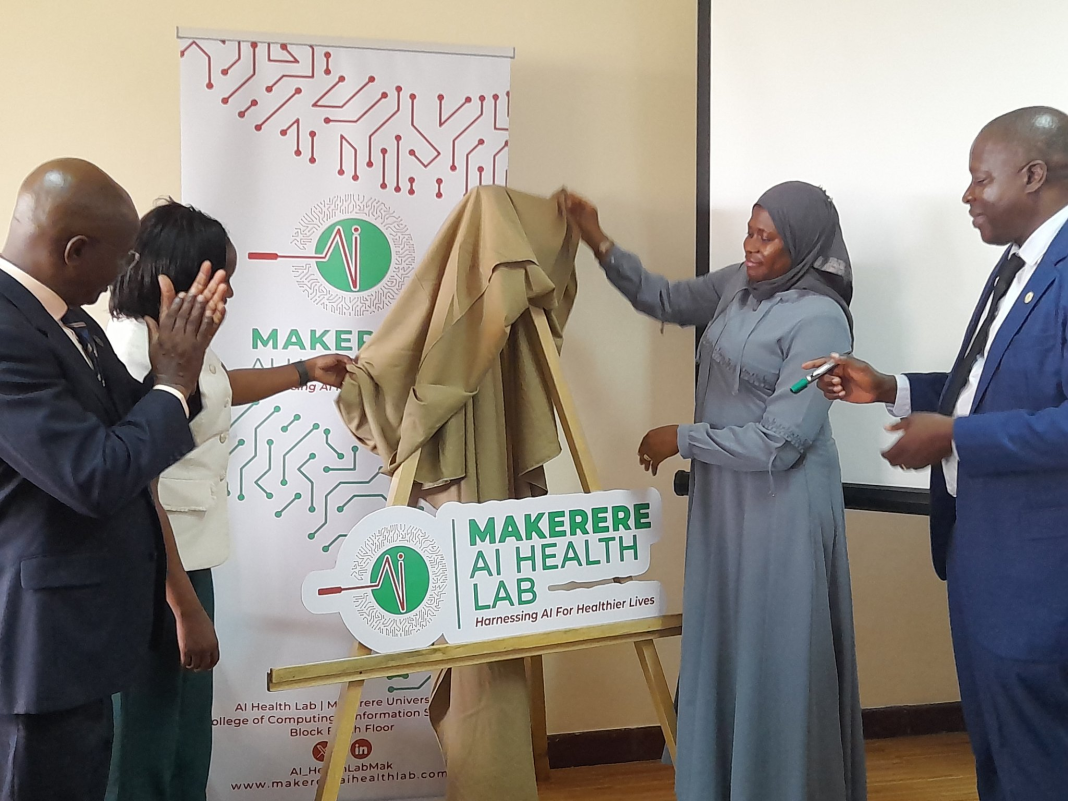The Government of Uganda, in collaboration with Makerere University, has inaugurated the Artificial Intelligence Health Lab.
This pioneering initiative aims to revolutionize healthcare delivery using artificial intelligence (AI), marking a crucial advancement for the nation. The lab is situated in Block B, College of Computing and Information Sciences.
Launching the lab on 30th May 2024, the Permanent Secretary of the Ministry of ICT and National Guidance, Dr. Amina Zawedde highlighted the importance of this development.
“Today marks a momentous occasion as we unveil the Artificial Intelligence Health Lab at Makerere University. This milestone signifies not just a step forward for the university but for our entire nation as we enter an era of innovation and advancement in healthcare through artificial intelligence,” she remarked.
Dr. Zawedde emphasized the transformative power of AI in healthcare, noting its potential to revolutionize diagnostics, treatment plans, and personalized care. She acknowledged the government’s ongoing efforts to integrate AI into healthcare through initiatives like telemedicine platforms, health data analytics, and AI-driven solutions in medical imaging and drug discovery.
However, she stressed the need for ethical and responsible AI deployment, addressing algorithmic biases, patient privacy, and equitable distribution of AI benefits.
“The Ministry of ICT & National Guidance is committed to supporting AI adoption in healthcare through policy guidance, financial support, capacity building, and infrastructure development,” Dr. Zawedde stated. She called for collaboration among government agencies, academia, healthcare providers, and technology partners to advance AI initiatives responsibly.
Dr. Aminah Zawedde, highlighted the importance of prioritizing locally developed solutions to better understand and effectively address national challenges. She outlined five key priorities for Uganda’s digital transition, focusing on infrastructure, accessibility, digital services, cybersecurity, data protection, privacy, digital skilling, and innovation.
Regarding infrastructure and connectivity, the government aims to expand coverage to 70% of the country within the next five years, with ongoing projects supported by the World Bank and China. This initiative targets essential institutions like schools, hospitals, administrative offices, and innovation hubs.
Ensuring accessibility of gadgets, particularly smartphones, is another critical focus area. Recognizing the importance of these devices for accessing digital technologies and apps, efforts are underway to lower costs through measures such as tax waivers and local manufacturing.
Additionally, the government is prioritizing the transition of services online to enhance efficiency, transparency, accountability, and ease of doing business. This move aligns with existing regulations and guidelines for digital transformation, with an emphasis on overcoming implementation challenges related to financial resources, capacity, and awareness creation.
Cybersecurity, data protection, and privacy are also paramount, with plans to develop trusted systems to safeguard digital infrastructure and user information. Furthermore, digital skilling initiatives aim to equip end-users and office management with the necessary skills for effective digital operations.
Finally, the government emphasizes innovation and entrepreneurship, celebrating community-driven solutions that are sustainable, acceptable, and impactful. This focus underscores the commitment to fostering a thriving ecosystem of innovation that addresses the needs of Ugandan society.
Dr. Myers Lugemwa from the National Malaria Control Program presented a compelling case for the integration of artificial intelligence (AI) tools in Uganda’s healthcare system. Addressing the current health challenges and the potential of AI, Dr. Lugemwa underscored the transformative impact these technologies could have on disease diagnosis and management.
“Globally, low-income countries face a higher burden of communicable diseases such as malaria, tuberculosis, and HIV/AIDS,” Dr. Lugemwa noted. “Despite a significant global decline in these diseases, they remain prevalent in countries like Uganda, where communicable diseases account for over 50% of morbidity and mortality.”
Malaria diagnostics primarily rely on tools like mRDTs, blood slide microscopy, and PCR tests, which are either expensive or not widely available. Similar challenges exist for other diseases such as cancer, tuberculosis, HIV/AIDS, and intestinal parasites, which are diagnosed through methods that may not be accessible at lower-level health centers.
Dr. Lugemwa highlighted the promise of Makerere University’s AI Health-Lab in addressing these diagnostic challenges. “AI tools could revolutionize the accuracy and accessibility of disease diagnosis,” he said. “From improving malaria diagnostics to streamlining cancer screening and diagnosis, AI has the potential to transform healthcare delivery in Uganda.”
Furthermore, Dr. Lugemwa discussed the role of AI in predicting disease patterns affected by climate change, such as malaria, and the importance of electronic health records (EHRs) in improving patient management and healthcare delivery.
“In summary, AI Health-Lab is poised to be a game-changer for Uganda’s healthcare system,” Dr. Lugemwa emphasized. “It aligns with Makerere University’s mission to ‘Build For the Future’ and addresses the Alma-Ata Declaration’s call for local tools that are readily available, accessible, affordable, and user-friendly. The integration of AI in healthcare is not just a technological advancement but a critical necessity for improving health outcomes in Uganda.” Lugema stressed.
Representing Makerere University’s Vice Chancellor, Prof. Edward Bbaale, Director of the Directorate of Graduate Research and Training, expressed pride in the university’s achievements. He underscored Makerere’s proactive steps in promoting AI, including establishing dedicated AI labs, integrating AI courses into the curriculum, and fostering partnerships.
“The establishment of the AI Health Lab is the culmination of a vision that aligns with Makerere University’s mission to be a thought leader in research, innovation, and academic excellence,” Prof. Bbaale stated.
He highlighted the lab’s role in fostering interdisciplinary collaboration and innovation, with potential applications ranging from predictive models for disease outbreaks to personalized treatment plans.
Prof. Bbaale also lauded groundbreaking projects spearheaded by Makerere University’s College of Computing and Information Sciences. These include the AirQo project, which deploys low-cost air monitoring systems, and AI-based tools for agricultural disease tracking and medical diagnostics. Notably, the AI Lab, under Dr. Rose Nakasi’s leadership, secured a $1.5 million grant from Google for the Ocular project, automating diagnoses for Malaria, Tuberculosis, and Cervical Cancer.
To the students and researchers, Prof. Bbaale urged them to seize the opportunities presented by the AI Health Lab. “This lab is not just a facility; it is a beacon of possibilities. Engage deeply with the work, collaborate across disciplines, and be bold in your pursuit of solutions that can change the world,” he encouraged.
He also outlined the university’s commitment to moving the entire research value chain from conceptualization to commercialization, ensuring that research translates into products and services that benefit communities.
The launch of the AI Health Lab at Makerere University signifies a significant leap forward in Uganda’s healthcare sector. With continued support and collaboration, this initiative promises to harness the power of AI to improve health outcomes, making a tangible difference in the lives of many. As Dr. Zawedde concluded, “Let us embark on this journey with optimism and determination, knowing that our efforts today will shape the future of healthcare for generations to come.”Bbaale added








